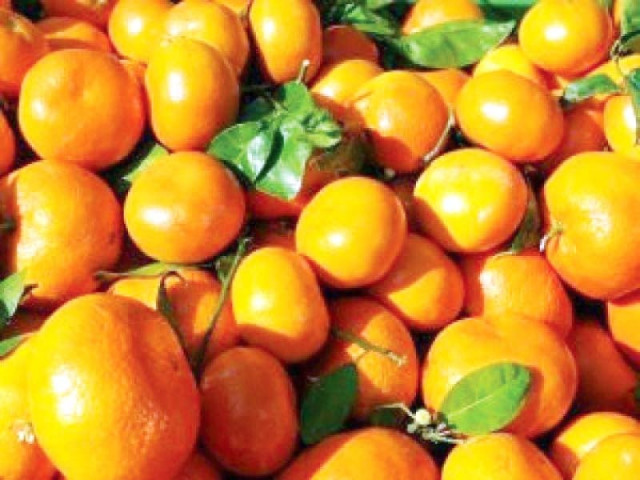Kinnow growers reject new purchase price
Exporters offer Rs600 per 40 kg, which is lower than last year

Application of modern techniques and traditional practices at all stages of production and in the post-harvest phase not only add value to the fruit that attracts premium prices, but also help increase exports. PHOTO: FILE
Kinnow orchard owners demanded that the authorities concerned address their grievances and announce reasonable prices for citrus purchase in light of the rising inflation, said FPCCI Standing Committee on Horticulture Exports’ former chairman Ahmad Jawad.
Talking to The Express Tribune, he said last year the price offered to kinnow growers was Rs850 per 40 kg and now Rs600 was offered, which was unjustified because prices of fertiliser - an essential crop input - had risen compared to the previous year.
“In addition to this, the price of diesel has reached Rs133 per litre, so how can growers sell at a reduced rate when their cost of production has increased already,” Jawad asked.
He pointed out that during the tenure of previous government, the prices of urea and di-ammonium phosphate (DAP) fertilisers were Rs1,200 and Rs2,380 per bag respectively. Now, the prices have swelled to Rs1,925 and Rs3,395 per bag respectively whereas potash price has gone up to Rs4,200.
“Right now, there is mistrust between the exporters and growers,” he revealed. “Growers feel that the exporters have slashed their share and are making good profit because they don’t share their volumes and international prices.”
He claimed that Pakistan Tehreek-e-Insaf (PTI)’s district office-bearers had influence on kinnow processing units in Sargodha and some factory owners were even associated with the PTI due to which they wanted to please them through attractive rates.
Punjab produces over 98% of the citrus fruit mainly in Sargodha district because of its favourable growing conditions and adequate canal and sub-soil water. Kinnow constitutes 80% of citrus fruits and is a major export commodity.
Application of modern techniques and traditional practices at all stages of production and in the post-harvest phase not only add value to the fruit that attracts premium prices, but also help increase exports that fetch foreign exchange.
Citrus Research Institute Sargodha is responsible for undertaking research and development work on kinnow and other citrus varieties besides Pakistan Agricultural Research Council (Parc).
Introduction of seedless varieties can lead to sustainable production of kinnow and increase in the area under cultivation.
Jawad added that agriculture departments needed to develop a comprehensive strategy to address priority issues in the short term and follow a long-term strategy for citrus development aimed at increasing exports. He insisted that there was a need to identify the growers, prepare database and develop a platform involving farmers, exporters and traders to address their grievances.
Jawad stressed that awareness campaigns should also be launched regarding field practices, harvest and post-harvest handling, transportation and processing through an integrated and coordinated programme involving all the stakeholders. He urged the government to take notice of the low kinnow price offered to the farmers and ensure protection of their rights, which was part of the PTI’s manifesto.
He also asked the exporters to consult the growers prior to deciding the citrus prices.
Published in The Express Tribune, August 16th, 2019.
Like Business on Facebook, follow @TribuneBiz on Twitter to stay informed and join in the conversation.


















COMMENTS
Comments are moderated and generally will be posted if they are on-topic and not abusive.
For more information, please see our Comments FAQ